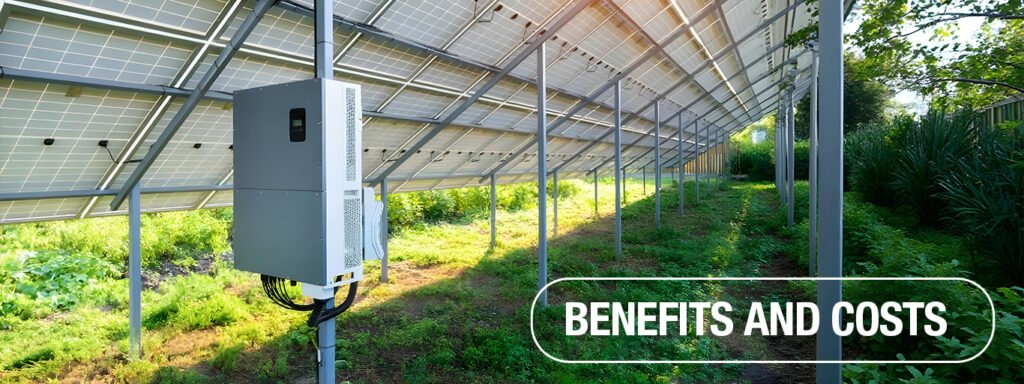As more Australian households seek ways to reduce energy bills and decrease their carbon footprint, solar power has quickly gained popularity. However, while installing solar panels is a common move for sustainable energy, many are now questioning if adding a solar battery is worth the investment. According to the Clean Energy Council, over 2.3 million homes across Australia have adopted solar energy solutions, making it clear that the trend is growing. But what about solar batteries? Are they an essential addition?
The decision to invest in solar battery storage comes with a variety of factors to consider. While a solar battery can help store excess energy for use at night or during cloudy days, its initial cost can be significant. A typical solar battery can range between $7,000 to $14,000, depending on size and technology. However, when factoring in the long-term savings and energy independence, it may be a worthwhile investment for many households.
What is a Solar Battery and How Does It Work?
A solar battery is a storage solution designed to hold excess energy produced by your solar panels during the day for use at night or during periods of low sunlight. Essentially, it acts as a power bank for your home, storing surplus electricity that your solar system generates and making it available when demand peaks or the sun isn’t shining.
Solar batteries are typically made of lithium-ion technology, similar to those used in electric vehicles, and can store energy for long periods. When your solar system produces more energy than your household uses, the excess energy charges the battery. Once the battery is full, any additional power is sent back to the grid. Conversely, when solar production drops, the battery discharges, supplying your home with energy and reducing the need to draw from the grid.
The Cost of Solar Batteries in Australia
When considering whether a solar battery is worth the investment, the cost is one of the most significant factors. Solar batteries in Australia typically range between $7,000 and $14,000, including installation. This price can vary depending on several factors, such as the battery size, brand, and the complexity of the installation. Larger batteries or more advanced models with higher storage capacity will cost more, but they can store and provide more energy, which could be beneficial for homes with higher electricity consumption.
While the upfront cost may seem daunting, there are incentives that can help reduce the financial burden. For example, the Australian government offers rebates and incentives through the Small-scale Renewable Energy Scheme (SRES) for solar installations, including batteries. These incentives can help offset the total cost, making solar battery storage more accessible. Additionally, some state governments offer their own subsidies or low-interest loans for energy storage systems, further lowering the financial barrier.
Despite the initial investment, many Australians are finding that the long-term savings on their energy bills can make the solar battery a worthwhile addition. For instance, a solar battery can help you store energy during the day and use it during peak times when electricity prices are higher, potentially saving hundreds of dollars annually.
Benefits of Solar Battery Storage
Investing in a solar battery offers several compelling benefits for Australian homeowners. While the initial cost can be high, the long-term advantages often outweigh this concern. Here are some of the key benefits:
1. Energy Independence
One of the primary reasons homeowners invest in solar batteries is to achieve greater energy independence. By storing excess solar energy, you can reduce your reliance on the grid. This is especially beneficial during power outages or peak electricity pricing times. In regions with frequent blackouts, a solar battery can ensure that your home remains powered without interruption.
2. Lower Energy Bills
A solar battery allows you to use the energy you’ve generated during the day at night, which can dramatically reduce your electricity bills. Without a battery, excess energy from your solar panels is fed back into the grid. While you may receive some compensation for this energy, it’s typically not as valuable as the energy you would save by using it within your own home.
3. Maximise Your Solar Investment
If you already have solar panels, adding a solar battery is a natural next step to maximise the value of your system. Rather than letting excess energy go to waste, a battery stores it for future use, ensuring that you get the most out of your solar investment.
4. Environmental Benefits
In addition to financial savings, solar batteries contribute to a cleaner, greener environment. By storing and using renewable solar energy, you can reduce your household’s carbon footprint and reliance on fossil fuels, supporting Australia’s transition to a more sustainable energy future.
How Long Does It Take for a Solar Battery to Pay for Itself?
Understanding the payback period for a solar battery is critical when deciding whether it’s a worthwhile investment. Generally, the payback period for a solar battery in Australia ranges from 5 to 10 years, depending on several factors such as electricity prices, the amount of energy you consume, and the capacity of the battery.
1. Electricity Savings
The most significant factor in determining your payback period is how much you save on your electricity bills. By using stored energy during peak pricing periods, you can avoid purchasing electricity at higher rates. The more energy you consume during these peak times, the faster your battery will pay for itself.
2. Government Incentives
Government rebates and subsidies can shorten the payback period. As mentioned earlier, the SRES and other state-level programs offer financial incentives that reduce the upfront cost of installing solar battery storage. These incentives can help make your investment more affordable and allow you to start saving sooner.
3. Battery Lifespan
Most solar batteries come with warranties of 10 to 15 years, which corresponds closely with the expected lifespan of the battery. The longevity of the battery means that, after the payback period, the remaining years will result in significant savings, as the battery continues to supply your home with free, stored solar energy.
In summary, while it may take a few years for your solar battery to pay for itself, the long-term savings on your energy bills, combined with government incentives, can make it a financially sound choice over time.
Factors to Consider Before Buying a Solar Battery
Before deciding whether to invest in a solar battery, there are several factors that should be taken into account. While the benefits are clear, it’s important to make an informed decision by considering the following:
1. Energy Usage Patterns
The amount of energy you use and when you use it plays a significant role in determining if a solar battery is a worthwhile investment. If you use a lot of electricity during the day when your solar panels are producing energy, you might already be maximising the use of your solar system. However, if you tend to use more energy in the evening or during peak times, a solar battery will allow you to store excess energy produced during the day and use it when it’s most needed.
2. System Size and Storage Capacity
The size of your solar system and the storage capacity of the battery you choose are crucial considerations. If you have a small solar system, a smaller battery may suffice, but for larger households or those with higher energy demands, you may require a more powerful battery to ensure that enough energy is stored. It’s important to choose a battery that aligns with your energy needs.
3. Installation and Maintenance Costs
In addition to the upfront cost of the solar battery itself, installation and maintenance costs must also be considered. A proper installation, which may require an electrician or specialist, can add to the overall expense. Furthermore, although solar batteries typically have a long lifespan, regular maintenance may be needed to ensure optimal performance over the years.
4. Battery Efficiency and Technology
Not all solar batteries are created equal. When choosing a battery, it’s essential to evaluate the efficiency, longevity, and the technology behind the product. Some batteries lose charge over time (known as self-discharge), while others may be more efficient at storing and discharging energy. Leading brands offer high-quality, reliable products that come with longer warranties and better customer support, so research into the available options is key.
5. State Incentives and Rebates
As mentioned earlier, some states in Australia offer additional incentives for installing solar battery storage. These can include rebates, grants, and tax credits. By taking advantage of these programs, you can significantly reduce the upfront cost and make the investment more attractive.
Solar Battery Storage: Is It Worth the Investment in 2025?
In 2025, solar battery storage continues to be a highly relevant and viable investment for homeowners in Australia. As electricity prices rise and the push for renewable energy intensifies, solar battery systems are becoming increasingly attractive.
1. Increasing Energy Costs
Electricity prices in Australia have been steadily increasing over the years, and they are expected to continue rising. By investing in a solar battery, you can shield yourself from fluctuating electricity prices and reduce your reliance on the grid. This makes the long-term savings more significant, especially for households that consume a lot of energy.
2. Improved Battery Technology
Solar battery technology has also improved significantly in recent years. Newer models are more efficient, longer-lasting, and come with better warranties than earlier versions. This means that when you invest in a solar battery today, you are more likely to experience better performance and a higher return on investment than previous generations of batteries.
3. Environmental Impact
As Australia aims to meet its carbon reduction targets, every step towards energy independence contributes positively to reducing the national carbon footprint. Solar battery storage not only helps reduce electricity bills but also ensures that your home runs on clean, renewable energy, which aligns with environmental goals.
4. Increased Home Value
Homes with solar panels and battery storage can potentially see an increase in property value. Many buyers today are looking for homes with energy-efficient features, and solar energy systems with battery storage can make your home more attractive to these buyers. This means that, even if you sell your home in the future, the investment in solar battery storage could be recouped through an increase in property value.
Given these factors, it’s clear that solar battery storage remains a smart investment for homeowners in 2025. The combination of rising energy costs, advanced technology, and environmental benefits makes it a compelling choice for many.
Conclusion:
In conclusion, the decision to invest in a solar battery ultimately depends on your household’s energy needs, the local electricity market, and your long-term sustainability goals. For many Australians, solar battery storage offers significant advantages, including reduced energy bills, increased energy independence, and a positive environmental impact.
While the initial cost of installing a solar battery can be substantial, the long-term savings, combined with government rebates and incentives, make it a financially viable option for many homes. Over time, as electricity prices rise and battery technology improves, the value of investing in a solar battery only becomes more apparent.
For homeowners looking to maximise their solar investment, protect themselves against rising energy costs, and contribute to a greener future, a solar battery could be a wise decision. The growing popularity of solar power in Australia suggests that the trend toward adopting solar storage solutions is only set to increase in the coming years. As such, 2025 could be the perfect time to take the leap and invest in solar battery storage.



